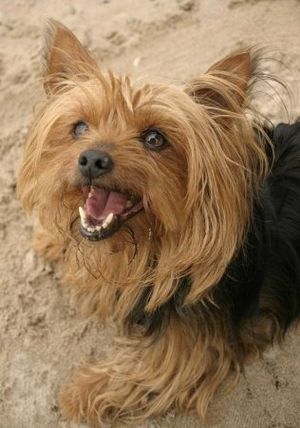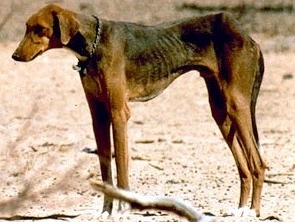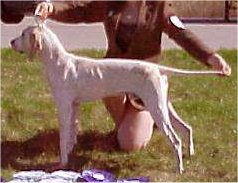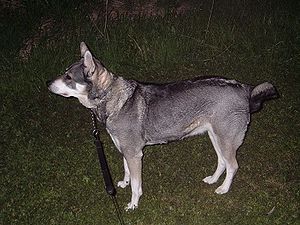 |
| Vital Statistics: |
| Place of Origin: England |
| Group: Terrier, Toy, Companion |
| Height: 8-9 in. |
| Weight: about 7 lbs. |
| Life span: 12-14 yrs. |
| Trainability: moderate, housetraining problematic |
| Good with children: older, kind children |
| Good with other pets: depends, when raised with them |
December’s Dog of the Month
Don’t let this breed’s diminutive size fool you. Typically terrier, they are lively and courageous.
The Yorkshire Terrier was bred by miners in Yorkshire, England in the 1800s to hunt the rats infesting the mine shafts. Among their forbears were probably black and tan terriers and the Maltese. Affectionately known as the Yorkie, this is a vigorous little dog.
What does the Yorkshire Terrier look like?
The Yorkie has a small head, medium length muzzle with a black nose. Height is about 9 inches, weight about 7 lbs. Its ears are set high, small, v-shaped and erect. Eyes are medium-sized and dark brown. The tail is docked and carried level with the back. The coat is long, fine and straight. Hair on the head is so plentiful, it needs to be tied back so as not to trail in food and for the dog to be able to see better. The Yorkie has no undercoat and in cold weather it needs protection when outdoors. Hair on the body and tail is dark steely blue, head, chest and limbs are tan. Daily grooming to avoid tangles in the coat is necessary.
What is the Yorkshire Terrier’s temperament?
The Yorkie is a typical terrier, lively and courageous. It can be stubborn and a bit domineering. It is very affectionate with its owner but may be wary of strangers and not very good with other pets. The Yorkie should be trained gently and socialized early to avoid unwanted behavior. As with all dogs the energetic Yorkie loves daily walks.
What are the Yorkshire Terrier’s uses?
The Yorkie, for its size is a very good watchdog, brave and clever. It is one of the most popular companion dogs in the world.
Possible Health Issues
Legg-Calve-Perthes Disease, hypothyroidism, patellar luxation, portosystemic shunt (liver defect), Hypoglycemia (low blood sugar), collapsing trachea, dental problems, bladder stones, hair loss, cataracts, distichiasis (abnormally grown eyelashes)
- Affenpinscher
- Brussels Griffon
- Cavalier King Charles Spaniel
- Chihuahua
- Chinese Crested
- Coton de Tulear
- Dachshund
- English Toy Terrier
- Havanese
- Italian Greyhound
- Japanese Chin
- Maltese
- Manchester Terrier
- Mi Ki
- Miniature Pinscher
- Moscow Toy Terrier
- Papillon
- Pekingese
- Pomeranian
- Pug
- Shih-Tzu
- Silky Terrier
- Toy Fox Terrier
- Xoloitzcuintli
- Alaskan Klee Kai
- Bichon Frise
- Bichpoo
- Brussels Griffon
- Bull Terrier
- Bulldog
- Cardigan Welsh Corgi
- Cavalier King Charles Spaniel
- Chihuahua
- Chinese Crested
- Coton de Tulear
- Eurasier
- French Bulldog
- German Spitz (Giant, Standard, Toy)
- Hairless Khala
- Havanese
- Japanese Chin
- Japanese Chin Dog
- Keeshond
- Lhasa Apso
- Lowchen
- Maltese
- Mi Ki
- Miniature Pinscher
- Moscow Toy Terrier
- Norwegian Lundehund
- Papillon
- Pekingese
- Pomeranian
- Poodle
- Portuguese Water Dog
- Pug
- Sanshu
- Schipperke
- Schnorgi
- Shiba Inu
- Shih-Tzu
- Tibetan Spaniel
- Airedale Terrier
- American Pit Bull Terrier
- American Stratfordshire Terrier
- Australian Terrier
- Bedlington Terrier
- Black Russian Terrier
- Border Terrier
- Boston Terrier
- Bull Terrier
- Cairn Terrier
- Cesky Terrier
- Dandie Dinmont Terrier
- English Toy Terrier
- Glen of Imaal Terrier
- Irish Terrier
- Jack Russell Terrier
- Lakeland Terrier
- Manchester Terrier
- Miniature Schnauzer
- Moscow Toy Terrier
- Norfolk Terrier and Norwich Terrier
- Old English Terrier
- Scottish Terrier
- Silky Terrier
- Skye Terrier
- Smooth and Wire-haired Fox Terrier
- Soft-coated Wheaten Terrier
- Tibetan Terrier
- Toy Fox Terrier
- Welsh Terrier
- West Highland White Terrier
- Wire Fox Terrier
- Airedale Terrier
- Beagle
- Bedlington Terrier
- Bluetick Coonhound
- Border Collie
- Border Terrier
- Bull Terrier
- Bulldog
- Bullmastiff
- Ca de Bou
- Cavalier King Charles Spaniel
- Clumber Spaniel
- Collie
- Curly-coated Retriever
- Dandie Dinmont Terrier
- English Cocker Spaniel
- English Foxhound
- English Setter
- English Springer Spaniel
- English Toy Terrier
- Flat-coated Retriever
- Golden Retriever
- Greyhound
- Harrier
- Jack Russell Terrier
- Lakeland Terrier
- Lancashire Heeler
- Llewellyn Setter
- Manchester Terrier
- Mastiff
- Norfolk Terrier and Norwich Terrier
- Old English Sheepdog
- Old English Terrier
- Otterhound
- Parson Russell Terrier
- Shetland Sheepdog
- Smooth and Wire-haired Fox Terrier
- Sussex Spaniel
- Welsh Terrier
- Whippet
- Wire Fox Terrier



